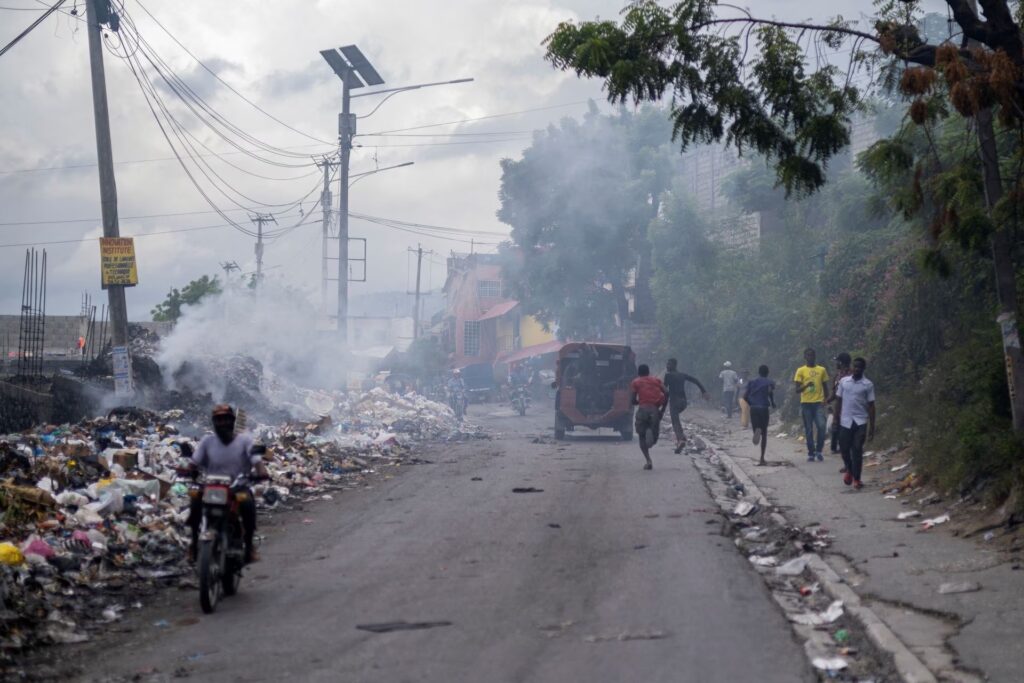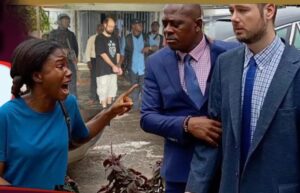
Though the US is pushing to intervene, international meddling hasn’t helped Haiti.
Gang violence has killed more than 530 Haitians this year and 187 in the past two weeks alone, as the security and political situation in the Caribbean nation continues to devolve. Decades of corrupt leadership and weakened democratic institutions — supported by the United States — have brought a state of terror and lawlessness to Haiti without an achievable political solution or even an end to the violence in sight.
The violence, concentrated in Haiti’s capital, Port-au-Prince, and the surrounding areas, is caused by political and economic factors including the decimation of the country’s largest economic driver, agriculture, and subsequent urban migration, small arms proliferation, and a political class willing to weaponize Haiti’s struggles to cling to power. The person nominally in charge of the country, acting Prime Minister and President Ariel Henry, lacks a true mandate to power and has proven incapable of managing the chaos, instead proposing to deploy the country’s young and fragile military to maintain order.
Haiti has faced serious and compounding crises, including a devastating 2010 earthquake, floods, cholera outbreaks, hurricanes, and corrupt, dictatorial, and incompetent leaders. But the current crisis affects everyday life to a perilous degree; ordinary Haitians are afraid to leave their homes even to access food and water. A fluid network of violent gangs controls nearly every aspect of life for thousands of people, government officials are either beholden to the gangs or attempting to use them for their own self-interest, and the international community has proven unwilling or unable to help Haitians — both those who leave and those who stay — find peace and safety.
The thread running through many of these crises is external, originating from international interference in Haiti’s affairs dating back to its independence in 1804. As is the case in many nations in Latin America and the Caribbean, the US has repeatedly tried to sway or command Haitian politics to its own liking, with devastating results for Haitians themselves and the country overall. The actions of the broader international community, too, have often been cruel, incompetent, or both, starting with French insistence on reparations from Haiti post-independence.
Though conversations about further US intervention in Haiti are already ongoing, continued interference is unlikely to produce a stable, flourishing democracy. Just last week, US President Joe Biden and Canadian Prime Minister Justin Trudeau met to discuss, among other issues, what to do about the violence in Haiti. While the US is pressuring Canada to lead an international military coalition to try to control the violence, Trudeau has not warmed to the idea given how poorly previous interventions have gone, according to the Washington Post.
The rise of criminal gangs, explained
Violence by groups and gangs connected to the state is not new in Haiti, but a number of factors have contributed to the gangs’ power at the present moment. Political leaders as far back as François “Papa Doc” Duvalier, Haiti’s populist elected leader-turned-dictator from 1957 through 1971, have formed and utilized armed groups external to national security forces for protection or to enforce their own agendas and self-interest, according to an October report from the Global Initiative against Transnational Organized Crime.
The present gangs are primarily affiliated with two groups, G-Pep and G9, which fight for control of Port-au-Prince. An estimated 60 percent of the capital is under the control of these groups, which terrorize civilians not only with threats of murder, but also abduction for ransom, extortion, and sexual violence, often at random.
The current gang structure arguably began under the auspices of former leader Jean-Bertrande Aristide, Daniel Foote, the former US special envoy to Haiti who resigned in 2021 over the Biden administration’s policy of deporting Haitian migrants, told Vox in an interview.
“Aristide started them on purpose in the early 1980s, as a voice, as a way to get some power” for ordinary Haitians, Foote said, “and they morphed over the years.”
Aristide formed armed groups called the Chimères, which offered protection rackets. In the intervening two and a half decades, former soldiers from the Haitian military (disbanded under Aristide’s second period in office, from 1994 to 1996) joined armed groups; during the earthquake in 2010, imprisoned gang members were able to escape, either rejoining old neighborhood gangs or forming new groups within camps intended for people displaced by the natural disaster. United Nations peacekeeping troops, stationed in the country in some capacity from 1993 till 2017, failed to contain the violence or stop the gangs from developing and growing — all the while engaging in multiple scandals including sexual violence.
Jovenel Moïse, who came to power in 2017 after a controversial election, allegedly operated in concert with the gangs, with members of his government “allegedly assist[ing] in massacres by providing gangs with government support in attacks in Port-au-Prince,” according to the Global Initiative Against Transnational Organized Crime.
Foote said that Moïse aligned with G9, which worked as a security force for him until his assassination. Afterward, the US imposed a de facto prime minister in Henry.
“He doesn’t have a great relationship with the gangs, because he’s kind of a clown,” Foote said of Henry. “They in several instances have made him pay them a bunch of money in order for him to attend an event or hold a ceremony — and then they won’t let him do it.”
The international role in Haiti’s crises can’t be ignored
Since Haiti established an independent nation in 1804, international actors have imposed grief and suffering on the nation, instigating crises or exacerbating existing ones. French slaveholders demanded reparations amounting to billions of dollars in today’s money, which Haiti was unable to pay off till well into the 20th century, despite its agricultural riches.
As Marlene Daut, a professor of French and African diaspora studies at Yale University, explained in a recent article for the New Yorker, Haiti was dealt another serious economic blow in 1981 during an outbreak of swine fever in the Dominican Republic, which occupies the island of Hispaniola alongside Haiti. US officials, agencies, and international actors like the International Development Bank worried that the disease would infect the US hog population and pressured Haitians to kill their prized Creole hogs, the backbone of Haiti’s agricultural sector.
The Creole pigs “once served as bank accounts for Haitian families,” Daut wrote, describing a scene from the 2009 documentary Poto Mitan: Haitian Women, Pillars of the Global Economy. A family with a fat, healthy Creole pig “could pay for food, clothing, and education” before the 1981 swine fever outbreak.
After Haitians were forced to kill their pigs, they were promised USAID compensation funds and replacement hogs from North America; however, the animals were unable to survive in the new climate. The country’s pork industry collapsed, Creole pigs went extinct, and Haiti’s economy changed forever, displacing people from the countryside into Port-au-Prince, entrenching economic instability, and creating the overcrowding and unemployment conditions that have allowed gang violence to proliferate.
The international community’s meddling in political affairs, too, has helped lead to this moment, Foote said.
“From the time the US Marines landed in 1915 until today — with a couple of exceptions — the US has chosen every leader, in different ways. And each time we do that, Haiti gets marginally worse because [the leaders] come in and turn into corrupt, if they weren’t already, knuckleheads, and then they start running a kleptocracy,” Foote said. “This is generational, this has been pent up for decades.”
Both Foote and Daut point to the Montana Accord, a document written by Haitians themselves outlining a political and institutional path forward after Moïse’s assassination, as a possible alternative to the Henry government and, potentially, the current state of terror. The accord, which was unique in unifying disparate aspects of Haitian society, chose a caretaker government, offered a plan for elections no later than this year, and demanded an end to foreign interference in Haiti’s domestic affairs.
An end to the present crisis and the beginning of a livable future, as Daut points out in her New Yorker piece, is complex, but both are possible with some creative steps, such as moving the government from Port-au-Prince to Cap-Hatïen, which could destabilize the gangs’ structure and help dissolve the government’s relationship with the gangs. But it also requires financial investment to allow Haiti’s economy to grow on its own terms, as well as investment in Haiti’s infrastructure and its young people.
Instead, there are calls for US and Canadian military intervention in Haiti, both from external and internal actors, while both the US and Canada crack down on asylum seekers — including those fleeing the violence in Haiti.
Read the Original Article on VOX



















